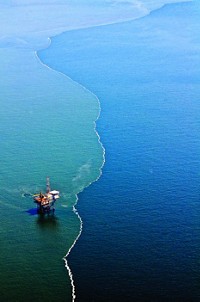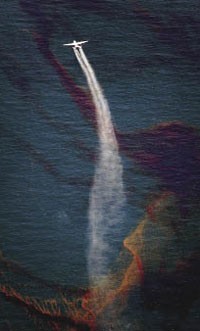Advertisement
Grab your lab coat. Let's get started
Welcome!
Welcome!
Create an account below to get 6 C&EN articles per month, receive newsletters and more - all free.
It seems this is your first time logging in online. Please enter the following information to continue.
As an ACS member you automatically get access to this site. All we need is few more details to create your reading experience.
Not you? Sign in with a different account.
Not you? Sign in with a different account.
ERROR 1
ERROR 1
ERROR 2
ERROR 2
ERROR 2
ERROR 2
ERROR 2
Password and Confirm password must match.
If you have an ACS member number, please enter it here so we can link this account to your membership. (optional)
ERROR 2
ACS values your privacy. By submitting your information, you are gaining access to C&EN and subscribing to our weekly newsletter. We use the information you provide to make your reading experience better, and we will never sell your data to third party members.
Safety
Oil Spill Could Alter Obama Drilling Plan
Energy: President promises a review of massive oil spill in the Gulf of Mexico
by Glenn Hess
April 30, 2010
President Barack Obama's recently announced plan to expand offshore oil and natural gas production could be modified as a result of the massive oil spill in the Gulf of Mexico, White House officials say.
As a fast-growing oil slick reached the shores of Louisiana on Friday, Obama says he still wants to increase offshore drilling, but will proceed cautiously in light of the "worsening oil spill" in the Gulf.
"I continue to believe that domestic oil production is an important part of our overall strategy for energy security, but I've always said it must be done responsibly, for the safety of our workers and our environment," Obama said this morning at the White House. "The local economies and livelihoods of the people of the Gulf Coast as well as the ecology of the region are at stake."
Obama said he has ordered Interior Secretary Kenneth Salazar to review what happened and report back within 30 days with "additional precautions and technologies" to prevent future accidents like this from happening again.
The deadly explosion on an oil rig last week and the resulting spill threatens to undermine recent momentum toward opening new offshore areas to drilling as a way to increase the nation's domestic energy supply. Last month, Obama unveiled a draft plan to eventually allow new drilling off parts of the Atlantic Coast, in the Gulf of Mexico, and near Alaska.
Up to 5,000 barrels, or 210,000 gal, of oil a day are thought to be spilling into the water after an explosion sank BP's Deepwater Horizon drilling platform and left 11 workers presumed dead. The slick has begun to reach the Louisiana shore, and the Navy has been sent to help avert an economic and environmental disaster.
At a White House briefing on Thursday, April 29, Press Secretary Robert Gibbs and other Administration officials said it's impossible to know what impact the massive spill would have on Obama's drilling plan until investigators determine what caused the rig to explode and sink in 5,000-foot-deep water.
Gibbs said the Gulf Coast spill would inevitably affect Obama's thinking on future offshore drilling, but he emphasized that environmental safeguards are built into the process of granting leases and exploring new oil fields. Obama's announcement, he said, was just "the beginning of the process" and drilling permits would take years to grant in any case.
Carol Browner, the President's top climate and energy adviser, said the oil spill and its impact "will become part of the debate" over offshore drilling, and the Administration will consider "what makes sense and what might need to be adjusted" as it looks to advance its energy plan. Obama's offshore proposal "doesn't automatically open up an area to drilling. It starts a process, and an area may or may not become open to drilling," Browner added.
On Capitol Hill, reaction to the spill has been mixed. Sen. Bill Nelson (D-Fla.), who has long fought drilling off the coast of his state, urged Obama to suspend new drilling and exploration in the Gulf of Mexico.
"I'm asking that you also call for an immediate halt to test wells and all other exploratory operations in coastal waters pending the outcome of federal investigations into the cause of this incident and the identification of ways to prevent something similar from happening again," Nelson wrote in a letter to Obama on Thursday.
But Sen. Mary L. Landrieu (D-La.), one of the biggest Democratic backers of the oil industry, said her colleagues should put the spill in perspective. "America needs 20 million barrels of oil a day to keep this economy moving," she said in a speech on the Senate floor on Thursday. The oil leaking each day from the accident in the Gulf amounts to less than one-quarter of 1% of the country's daily usage, Landrieu noted. "So we must continue to drill."
For chemical companies operating in the Gulf Coast, the oil spill will have an impact if it shuts down shipping in the Port of New Orleans, says Dan S. Borne, president of the Louisiana Chemical Association. "If the spill impedes navigation or access to the port, that's significant because the Louisiana chemical industry ships 10% of its product overseas," Borne notes.
But the spill will not taint water supplies and affect the actual operations of the chemical plants in the Gulf, he adds. "They get water from the Mississippi River," Borne says. "If it closes shipping for a long time, there would be a business impact."
The American Chemistry Council, which represents the nation's largest chemical companies, could not immediately say whether the incident will have any impact on the industry's longtime support for expanding the U.S. energy supply by increasing by offshore production of oil and gas.





Join the conversation
Contact the reporter
Submit a Letter to the Editor for publication
Engage with us on Twitter